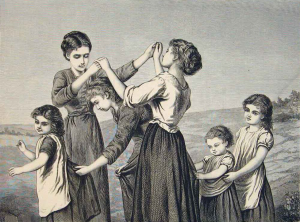“Oranges and lemons, say the bells of St. Clement’s….” Here’s a reprint of last year’s Book of Days chapter from the 23rd of November, Old Clem’s Night. Sometimes (like today) it seems hard to write it any better than it was the year before, and sometimes (like today) I am on vacation: Seth and I are currently in snowy Illinois, preparing for Thanksgiving with family. Follow our adventures on Instagram (#illinoisthanksgiving) and for today, enjoy our reprint of this fascinating minor holiday. Read to the end of the chapter for a bonus gift that wasn’t part of last year’s chapter. Happy Old Clem’s Night!
November 23 is the feast day of St. Clement: St. Clement’s Day, or Old Clem’s Night in England. He’s the patron saint of metal workers and blacksmiths, and Old Clem’s Night traditionally begins at the anvil, which is struck pretty consistently in the blacksmith’s trade, but on Old Clem’s Night, there is the addition of a small measure of gunpowder. The ensuing small explosion is what rings in the celebration. It’s a boisterous one, to be sure, involving processions of smiths, some of whom are dressed as St. Clement, with stops at every tavern along the way. We can assume there was no shortage of ale on Old Clem’s Night, and there also was no shortage of toasts and huzzahs for the smiths. Toasts like:
Health to the jolly blacksmith, the best of all fellows,
Who works at his anvil while the boy blows the bellows!
One of the legends of St. Clement places him as the very first man to refine iron, and to shoe a horse. That’s not terribly likely, however, and our ancestors may have been confusing Old Clem with a mythical blacksmith of Saxon origin: Wayland the Smith, whose feast day was also about this same time of year. But St. Clement has always gathered romantic legends about him. What we know for sure is he was one of the early Christian martyrs, being thrown overboard from a boat and fixed to an old iron anchor in the First Century AD.
He’s an interesting fellow, Old Clem. While the smiths were most likely getting drunk on ale, the children were going about clementing: going door to door, begging for apples and pears and nuts in exchange for singing old rhymes. When I asked my mother many years ago about her recollections of trick-or-treating when she was a little girl in Brooklyn, one thing she remembered was going door-to-door not at Halloween but rather around Thanksgiving. She didn’t call it clementing, but it sure sounds like it to me, especially when you realize that on some years, Thanksgiving and St. Clement’s Day would even fall on the same day.
One of the rhymes clementing kids may have sung in exchange for apples and pears was probably an old nursery rhyme that is still well known. Do you know it?
Oranges and lemons,
Say the bells of St. Clement’s.
You owe me five farthings,
Say the bells of St. Martin’s.
When will you pay me?
Say the bells of Old Bailey.
When I grow rich,
Say the bells of Shoreditch.
When will that be?
Say the bells of Stepney.
I do not know,
Says the great bell of Bow.
Here comes a candle to light you to bed,
And here comes a chopper to chop off your head!
The bells in the song refer to the bells of churches in and around London. The ending is rather abrupt, isn’t it? But it’s part of a game that’s being played by the girls in the old engraving above. Two players form an arch with their arms, and at the end of the rhyme, things really speed up––both the song and the running through the arches. But finally the arches come down… and then that’s it for the kid who’s trapped in those arms: Off with her head! Or at least out of the game.
Image: “Oranges and Lemons” by Nicholl Bouvier Games. Engraving on paper, from the book The Pictorial World by Agnes Rose Bouvier, 1874. [Public Domain] via Wikimedia Commons.
Who remembers Book of Love? Who remembers the 80s? Here’s Book of Love singing their song Oranges and Lemons in concert in 1989, and yes… they do mention the bells of St. Clement’s!
